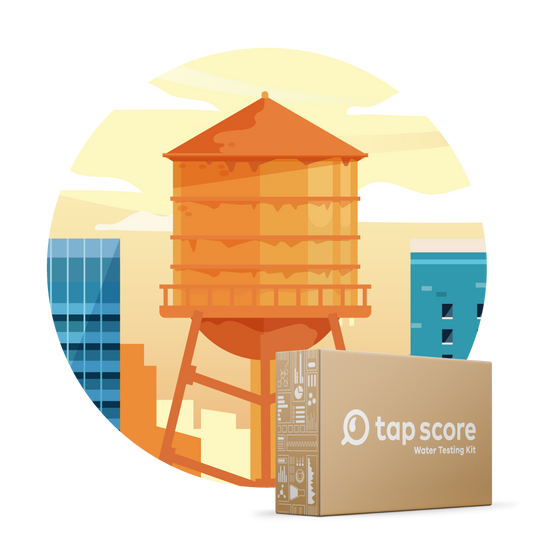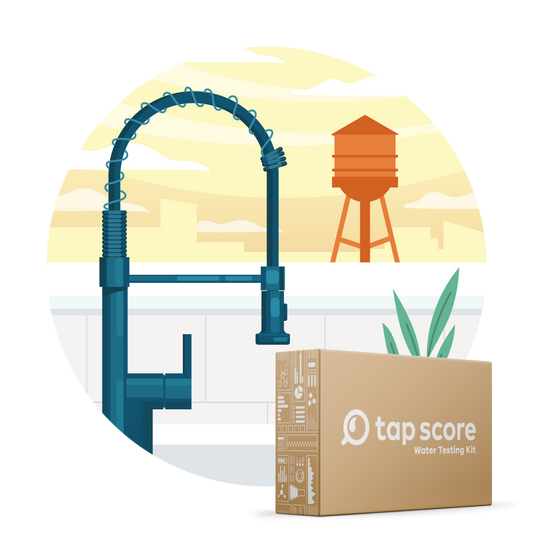
Quick Guide to NSF Certified Filters for PFAS
Our blog is written by real experts— not AI. Each guide is carefully reviewed and updated based on the latest research. Plus, with no affiliate links, you can count on unbiased insights you can trust.
PFAS — per- and polyfluoroalkyl substances or “forever chemicals” — have become a notable water quality issue. But there’s no point in investing in a water filter if you can’t be sure it will reduce PFAS in your drinking water. Certifications — in tandem with laboratory water testing — help you better understand what contaminants are in your water and what treatment device would be best to reduce them.
In this latest affiliate-free guide to certified water filters, we’ve combed the marketplace to find filters NSF/ANSI-certified water filters that remove PFAS in drinking water. As ever, these are not recommendations or endorsements, simply a listing, prompted by our curious customers.
Table of Contents:
- The Importance of Certified Filters
- Relevant Standards for PFAS/PFOS/PFOA
- What Filters Are Certified to Reduce PFAS?
- How Do I Know if PFAS Compounds Are in My Water?
- What’s the Best Filter for Me?
- What’s the Takeaway?
Disclaimer: Unlike most product lists, this guide is free of affiliate links. We do not earn commissions on any product we mention. In fact we do not link to products at all; this list will help reduce your search time by offering you a glimpse at filters certified by NSF, WQA, or IAPMO.
Why Should Water Filters Be Certified to Remove PFAS?
Because you want to be sure that any potential treatment device is composed of nontoxic materials and will reliably and adequately remove PFAS.
In the absence of any federal regulation of treatment devices, the National Sanitation Foundation (NSF), working with the American National Standards Institute (ANSI), designs standards to help provide consumers with unbiased information about which products will be effective for their water treatment needs.
In addition to the NSF, the WQA (Water Quality Organization) and IAPMO (International Association of Plumbing and Mechanical Officials) also grant certifications to water treatment devices that meet standards for performance and safety. NSF, WQA, and IAPMO certifications are all of equal stature. What matters is that the product in question has undergone a thorough evaluation by a third party that specializes in testing and certification.
NSF/ANSI Certifications Explained
Is NSF/WQA/IAPMO Certification Necessary?
Not necessarily. Certifications are voluntary and they cost money. Some filtration companies opt to skip certifications while making a product that is effective and would pass certification tests. But the lack of certification could very well mean that the product is inferior and would have been unlikely to meet certification standards. There’s no way to know the intentions behind not getting certification.
We recommend testing your water for PFAS first so you can get a clear picture of your water’s contaminant profile. The most important part of choosing a water filter or treatment system is knowing what you want to filter out of your water.
With serious contaminants like lead or PFAS, you want a filter that’s been certified because you don’t want to risk consuming contaminated water under the impression that your filter is doing its job.
What Are the Relevant NSF/ANSI Standards for Filtering PFAS/PFOS/PFOA?
There are two relevant NSF/ANSI standards for the reduction of PFAS.[1] They are:
- NSF/ANSI 53: Drinking Water Treatment Units—Health Effects
- NSF/ANSI 58: Reverse Osmosis Drinking Water Treatment Systems
NSF/ANSI 53 includes a wide variety of contaminants that are considered human health hazards. A treatment device does not need to be effective at reducing all of the contaminants under the standard for certification, only the specific contaminant (or class of contaminants) in question (PFAS in this case).
NSF/ANSI 58 applies specifically to reverse osmosis (RO) treatment systems. Again, certifications are given on a contaminant by contaminant basis.
Within these two standards are three PFAS-related certifications a product can receive:
- PFOS Reduction
- PFOA Reduction
- Total PFAS Reduction
- Includes perfluoroheptanoic (PFHpA), perfluorohexane sulfonic acid (PFHxS), perfluorononanoic acid (PFNA), perfluorooctanoic acid (PFOA) and perfluorooctane sulfonate (PFOS), perfluorobutanesulfonic acid (PFBS), perfluorodecanoic acid (PFDA)
This means a device can be certified to reduce PFOS or PFOA individually, or to reduce all seven different PFAS compounds (including PFOS and PFOA) under the moniker of “Total PFAS.”[2]
Note: NSF P473 was developed by NSF/ANSI for the reduction of PFOA and PFOS, which became effective around 2016-2017. The protocols have been implemented into both NSF/ANSI 53 and NSF/ANSI 58.
That’s where the results of your water test come in handy. If “forever chemicals” are your concern, a PFAS water test will break down in detail which specific PFAS chemicals are in your water (if any). That in turn allows you to see if the filtration product in question has the appropriate certification to effectively reduce the specific PFAS in your water.
PFAS in Drinking Water: Everything You Need To Know
What Water Filters Are Certified to Remove PFAS?
The products on the following list (including the brand, product name, SKU and certifying body) are certified for the reduction of PFOA/PFOS or Total PFAS in drinking water.
This list was last updated May 2025. To confirm a product is still certified for PFAS reduction you can search their websites or call NSF, WQA or IAPMO directly. Remember, these are not recommendations or endorsements.
Countertop Systems & Cartridges Certified to NSF/ANSI 53 for Reduction of PFOA/PFOS Only
-
Brita Elite/Longlast+
(OB06) NSF/WQA
-
Brita Hub Filter
(CT01) WQA
-
ZeroWater 5-Stage Filter
(ZR-017) IAPMO
-
AquaTru Carafe
(System: AT100/ Cartridge: 10AT100RF01) IAPMO
-
Aquasana Clean Water Machine
(AQ-CWM2-R) WQA
-
Clearly Filtered Pitcher Filter
(CF-PRF) WQA
-
Brondell Capella
(System: RC250/ Cartridge: RF-50) WQA
Faucet Filters Certified to NSF/ANSI 53 for PFAS Reduction
-
Culligan Faucet Mount Filter (PFOA/PFOS)
(System: CFM-300CR/ Cartridge: CRFM-001) WQA
-
Espring UV-C LED Above the Counter Unit with Diverter (PFOA/PFOS and Total PFAS)
(System: 122940/ Cartridge: 122943) NSF/WQA
Under-sink Systems & Cartridges Certified to NSF/ANSI 53 for Reduction of PFOA/PFOS
-
Hydroviv Drinking Water System Cartridge
(14cZIP) NSF
Reverse Osmosis Systems Certified to NSF/ANSI 58 for PFAS Reduction
-
RKIN Zero Installation Purifier Countertop RO Water Filter (PFOA/PFOS)
(System: RKIN-ZIPAL/ Cartridge: FBA-ZIPFBL) IAPMO
-
Culligan Aquasential RO Drinking Water Filtration System (Total PFAS)
(System: RO/ Cartridge: RO50) WQA

If we need to add an item or one of these has since lost its certification, please contact us at support@mytapscore.com
How Do I Know What PFAS Compounds Are in My Water?
Unless you’ve been notified by your water provider or have prior knowledge from another source, the only way to know if you have “forever chemicals” in your water—and which substances in particular—is to have your water tested by a certified laboratory. PFAS are a diverse group of chemicals invisible to the naked eye, with no taste or odor.
Tap Score simplifies the water testing process by offering a wide range of kits that are linked to a nationwide network of certified laboratories. Additionally, our helpful customer support team is there to guide you every step of the way.
What Is the Best Way to Test for PFAS in Drinking Water?
What’s the Best Water Filter for PFAS?
Simply put, the best water filters for PFAS are the ones that effectively reduces the specific PFAS compounds in your water supply. In addition to the effectiveness of a product against the contaminant of concern, there are many factors to consider when choosing a water treatment system. These include:
- Monthly operating costs
- Ease-of-use
- Filtration rate
- Replacement/maintenance requirements
All of the treatment devices listed above have been certified by one of the three third-party certification firms we mentioned (NSF, WQA, or IAPMO). You’ll want to take a look at each of these devices and see how they fit in with your treatment needs, budget, and other constraints (e.g., size of the system vs. area available).
What's the Takeaway?
- NSF/ANSI standards help consumers feel confident that certified treatment devices are composed of nontoxic materials and will reliably and adequately remove PFAS
- To meet NSF/ANSI’s certification requirements, a device must meet the reductions claims for the compound(s) it claims to effectively treat (PFOS, PFOA, or Total PFAS)
- The best PFAS water filters are certified to effectively reduce the specific PFAS compounds in your water supply
- One of the only reliable ways to know if you have forever chemicals in your water is to have your water tested by a certified laboratory
Read our other certified filter quick guides:
Certified Water Filters for Lead
Certified Water Filters for Fluoride
Quick Guide to Faucet Filters






